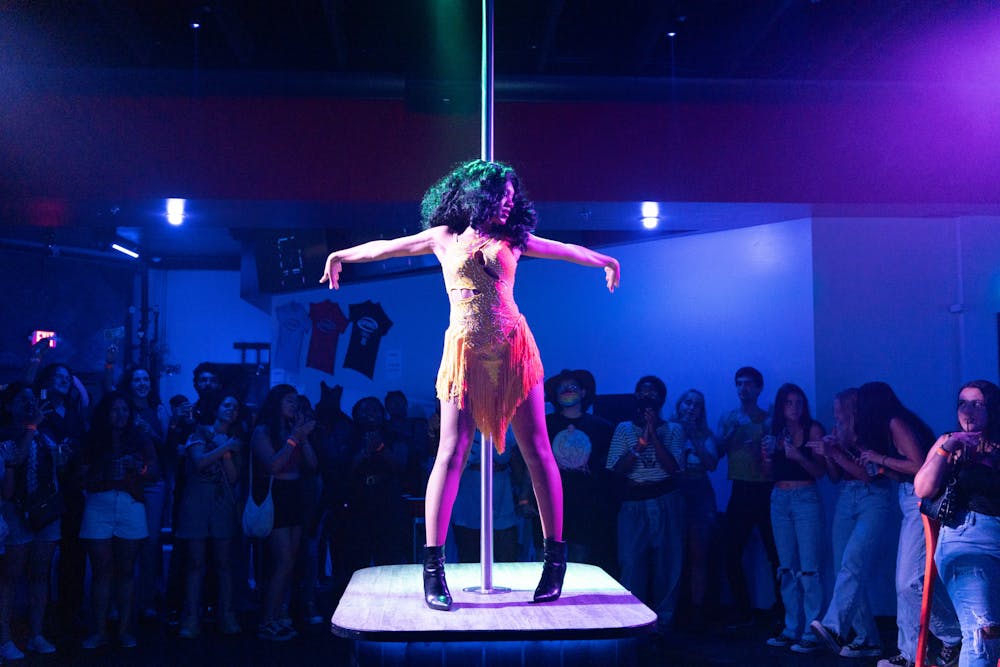Editor’s note: Some of the names used in this article are stage names.
A crowd clustered around Capones’ stripper poles, faces illuminated in neon purple light, captivated by the pounding bass and holding out dollar bills. Donning yellow fur coats, animal print bodysuits, knee-high leather boots and sequined dresses, four drag queens strutted and shimmied to pop hits at the first-ever “Queens at Capones” drag show July 5.
The show, organized by UF Graduate Assistants United, a labor union representing over 4,000 UF graduate employees, brought the art of drag to another venue with the hopes of increasing its presence in Gainesville.
Cassie Urbenz, GAU co-president and the event’s organizer, said the show was meant to be “a lot of healthy firsts” and an extension of Pride month, which ended June 30.
The 23-year-old said she hoped it was a chance for people to “get access to a space that they were missing in some way, shape or form, whether it be they hear their favorite song in the club for the first time or they get to see their friend try drag for the first time or they get to be invited into the space for the first time.”
Drag is similar to acting and typically involves costumes, makeup and other tools to exaggerate forms of gender. Drag shows are for entertainment, but they’re also used to draw attention to gender inequalities and embrace non-conformity.
The Capones event included an EDM set, a drag performance by experienced drag queens and an amateur drag contest. GAU hosted a drag show in the past, but Urbenz said this was the first time the organization hosted an event with such variety.
The contest, which allowed newcomers to engage in the art form in a beginner-friendly space, was judged by drag queen Emma Gration, GAU Co-President Eva Garcia Ferres, UF Pride Student Union President Jonathan Stephens and UF Student Government Senator Coe Leavengood on three categories: first time in drag, high fashion evening bag and summer body.
On Instagram, GAU wrote the event was “an opportunity for education, celebration and intersectionality.”
Urbenz, who’s also involved with Scene Queens, a drag and burlesque performance at the Hippodrome Theater, said she hoped the event captured and embraced the niche aspects of drag.
“It’s kind of all over the place,” she said. “We have a trans girl EDM set, we got amateur drag, we got girls twirling on the poles. [GAU] has been really outspoken about minority rights and disenfranchised individuals at UF, and this is just part of that.”
Drag queen and Scene Queens host Nyqolas Pyqolas, 25, who danced their way through Sabrina Carpenter’s “Espresso” flaunting red pigtails and stilettos, said they were excited about drag’s debut at Capones for its addition to Gainesville’s nightlife and potential to shift perspectives.
“It's kind of just all about broadening people's scopes of what art is, of what entertainment can be,” they said. “Drag as an art form is important by virtue of its complete and utter defiance of our current social and political landscape.”
Pyqolas said they were pleased with the turnout and hoped to make a monthly appearance at Capones.
“I hope that Capones keeps inviting us back,” they said. “All of [drag] is important and ought to be protected.”
The history of drag in the United States is extensive with roots tracing back to the 19th century. Though not often widely accepted, it continued to exist in vaudeville, burlesque and other theater performances during the late 19th and early 20th century.
It has now developed into a tight-knit community and an outlet for creative expression. Dreamer K. Black, 24, another performer and Miss University Club Newcomer 2024, defined drag as an “extension to one’s self or even a persona of one’s self.”
She said she hoped the event helped people “appreciate the art of drag and find something with themselves that they never really saw before.”
Dreamer K. Black gyrated to Gwen Stefani’s “What You Waiting For,” cartwheeling, tossing one dollar bills and grinning as audience members whistled. In one swift movement, she removed her wig to reveal a shorter one underneath. The crowd roared.
“The energy was there,” said 19-year-old Miami resident Shenill Alfonso. “[These events] make people feel like they belong. Not everybody has to look the same.”
Liset Cintra, a 20-year-old Miami resident, said she liked how unique the event was.
“There’s other things out there in the world aside from what [people] see every day,” she said. “Everybody has to see this. It’s awesome.”
Around 400 people attended the show, according to event organizer Cassie Urbenz. All cover fees from the night went directly to the staff and the queens, who also worked for tips. The show’s host, 24-year-old Dontae Brooks, said support from the Gainesville community goes a long way to show progress is possible.
“More venues mean more opportunity for all of us,” she said. “I also hope it moves forward in creating a safe space for everyone.”
The show ended with a finale by Brooks, known as Kehlani Kelly on stage, whose sassy, split-filled performance filled the nightclub with thunderous applause and an eruption of cheers.
“You heard the crowd,” she said. “We’ll be back.”
Contact Grace McClung at gmcclung@alligator.org. Follow her on X @gracenmclung.
Grace McClung is a third-year journalism major and the university administration reporter for The Alligator. In her free time, Grace can be found running, going to the beach and writing poetry.






